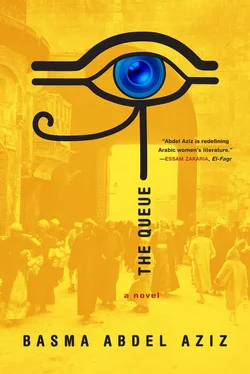From the sack she pulled a pile of papers, all in disarray, and stared at one page after another, but she couldn’t find the report her daughter needed. Ehab was drawn to the commotion and offered to help. He crouched next to her and put the papers in order, by date: reports and patient certificates to one side, and examinations to the other. He was nearly finished and had just picked up the last few papers when he read the title on the first page and suddenly paused. His eyes widened, and the page trembled in his hand. On this yellow piece of paper, which didn’t resemble the one before it, he’d found a short conversation. It had seemed familiar at first glance, though he didn’t know where he’d seen or heard it. Then suddenly his memory breathed life into the words. It was a phone call he himself had made a couple of days earlier to a colleague at the newspaper. “Saeed, things have gotten strange here. There are more and more people, the Gate is closed, and I’m hearing weird tales and stories. Let’s meet next Saturday, I’ll have written it all down by then.”
In the bottom left corner of the page, he read three words in thick red ink: Important — Follow-up . He turned the page and saw his own personal information, dead center, detailed and clear. There were more discussions and conversations in the following pages, but they were other people’s, identified by names written on the back of every page.
Um Mabrouk noticed the sudden change that came over Ehab’s face, and since she herself couldn’t read, she asked if the report was really that bad. She wanted to know if her second daughter would die soon, just like her first, but he didn’t answer her. He remained silent as a shade of red crept across his face and neck, and then his voice emerged, sticking in his throat, asking her where the papers had come from. He didn’t understand anything she said; there were too many hospitals to count, and labs for analysis, and X-rays, and doctors in clinics and in centers, and health insurance; she told him there had been other papers but an official had taken them from her at the Booth right before she came to the queue, and then she made him swear to tell her the truth about her daughter’s condition and why he was so alarmed.
He gave her the report she needed, and assured her that his reaction had nothing to do with her daughter; she’d just accidentally taken some other papers and he would return them to those to whom they belonged. Um Mabrouk clung to the pages and begged him not to lie to her, she’d endured so much and just wanted the truth, she told him, and her son began to cry. She wouldn’t let him leave until he took the report, read it, and explained it to her in simple terms so she could understand. He promised to tell her the truth, and said she needed to finish her paperwork so she could do the surgery and save her daughter. His hands still trembling, he took the yellow pages, folded them carefully, and put them in his pocket. As he left, Um Mabrouk called after him with all the prayers she could remember. He headed to a place filled with scattered tree stumps and scraps of old cars, a place he would go whenever he wanted to write. He took out the papers and began to read them, patiently and deliberately, pausing over every word.
There were five pages in front of him. One was about him, another was about Ines, and the other pages concerned three people he didn’t know, not their names, and not whether they were veterans of the queue or had never been there. He went back and watched Ines from afar. She was in her usual place. Um Mabrouk was rolling out her mat, Shalaby stood next to her, and a dish of fuul beans and a handful of pickles were sitting on a page of newsprint in front of them. Um Mabrouk offered Ehab some food as he approached, introducing him to Shalaby, but he shook his head, thanking her, and walked past them to Ines. He introduced himself, but she said she knew who he was — he was well known in the area, and she’d heard of him even though they’d never spoken.
He asked her if she could spare a few minutes so he could explain something important, out of earshot of the others in the queue. They took a few steps away from her mat, but she kept her eye on it, afraid that some opportunist might steal her place. Ehab took out the paper, told her to stay calm, and asked her to read it. Curious, she took the page. The conversation was long but she clamped her hand over her mouth when she read the first two lines, suddenly on the verge of tears.
“I’m really sorry, I’m sorry, I swear, I didn’t mean anything by it, they’re just words, I didn’t mean to—”
He cut her off, saying there was no need to be sorry. He was in exactly the same position; there was a record of one of his phone calls on another page. Ines stopped crying and opened her mouth, but this time no sound came out.
“But I didn’t talk to anyone on the phone today, or yesterday,” she said suddenly, shocked. “I was talking to Shalaby, who was standing behind me.” Holding the page tightly, she looked back at the others. “Shalaby, excuse me, do you have a minute?”
At first, Shalaby didn’t understand what they were saying. Ines accused him of passing on what she’d said, but took it back when Ehab explained the situation. Shalaby hadn’t listened to Ehab’s phone calls and couldn’t have passed them on, too, Ehab reasoned. Shalaby himself confirmed what Ines said — she hadn’t spoken on the phone at all, nor left his sight since their conversation. He was telling the truth, he added, and this had nothing to do with how wrong she was about him or his cousin the martyr. Um Mabrouk interjected, too, swearing that Ines was a highly respected teacher. She had morals, her students learned a good deal from her, and she definitely hadn’t said anything behind Shalaby’s back.
THE SECOND DISGRACEFUL EVENTS
Hammoud locked and bolted the door to the coffee shop and shouted into his cell phone, which hadn’t stopped ringing since he’d refused to serve the queue again. He wasn’t coming back to work, he insisted, until the clashes around the coffee shop were dispersed and everything calmed down. The news spread through the queue within hours, and soon everyone knew that the Events had flared up again. It was the microbus drivers who began to keep people in the queue updated on the latest developments, although it wasn’t easy for them to deliver news. According to new regulations, vehicles weren’t allowed to drive alongside the queue anymore. The drivers had to leave their buses at the corner where a soldier stood, and then walk the rest of the way to the queue itself to pass on what they heard on their daily routes.
Most drivers continued to share updates that way, free of charge, for as long as the Events lasted, simply out of a sense of community. A deep-rooted friendship had grown between the drivers and the people waiting in the queue, and now it bore fruits of solidarity. No one expected the fighting to continue like this, and they wagered that life would soon return to how it had been before. Eventually, they told each other, the soldier would get used to them and allow microbuses to drive on the sidewalk again, as they’d been doing since the street had filled with people waiting in the queue. But their bets were lost in the blink of an eye. A big sheet-metal hut with two square windows appeared in the middle of the intersection one day, blocking the road, and not even the smallest cars could pass around it. The soldier was stationed inside it now, behind a sign with the phrase NO ENTRY FOR VEHICLESand the same signature, Abbas .
People who witnessed the Second Events described a battle that raged at the edge of the main square, but no one could tell exactly who the people involved were. There seemed to be different factions, but just like during the First Events, the combatants wore no uniforms and bore no symbols. No one involved would answer questions, and they ignored everyone else. Eyewitnesses disagreed over how many were injured and killed, and though the wails of ambulances were heard, no one saw anyone being transported away. Here and there, people noticed deep, wide puddles of blood, but only rarely did they see someone bleeding. A grizzled, stubble-chinned driver swore to a group of people in the queue that with his own eyes he’d seen a barefoot young man so wounded that his leg was about to fall off, his hand fiercely clasped around a clear plastic bag. Inside, the driver said he could make out small silver pellets, covered in a dark red liquid. The driver said that a plainclothes officer had offered to buy the bag and everything in it, but the young man had grimly refused. A violent struggle had ensued, which ended with the officer stealing the bag and sprinting away with it before he could be stopped. The young man tried to chase after him, but his leg failed him, and he sat down on the ground and wept.
Читать дальше











